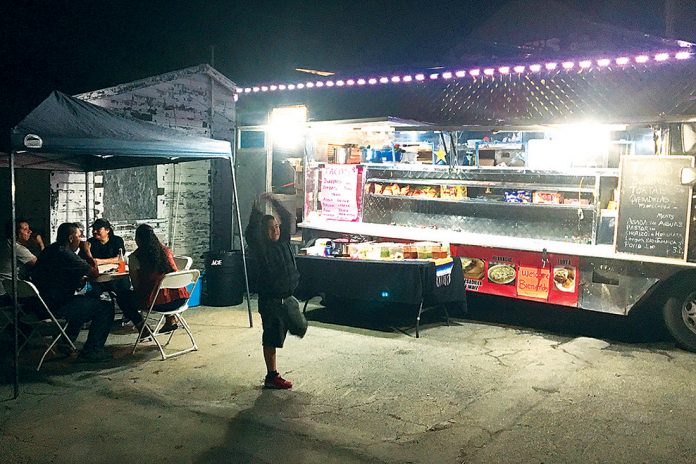WATSONVILLE—The City of Watsonville is cracking down on unpermitted food trucks and weighing whether to rework its rules regarding the mobile food vendors in the coming year.
The City Manager’s office has received numerous complaints about food trucks from several brick-and-mortar restaurant owners over the last month, according to Community Development Department Director Suzi Merriam.
“What the big complaint is, is that these are competing with the brick-and-mortar restaurants in town,” she said. “[They say that] it’s not fair that food trucks are not paying rent, they’re not paying property taxes, that they’re not contributing to the local economy.”
And some, Merriam said, do not hold the necessary permits and licenses needed to operate within city limits.
Mobile food vendors require a permit from the police department and a business license from the City. They also need to pass an inspection from County Environmental Health and the fire department.
Code enforcement officers over the past three weekends found at least seven food trucks operating throughout the city were lacking one or more of the needed permits, Merriam said.
Code enforcement officers did not hand out any citations during their first sweeps, Merriam said. Instead, they gave those trucks a warning, and explained the application process.
Merriam said only two had obtained the necessary permits and another two had picked up the application packet from the City. Most, she said, have been understanding of the requirements.
“If they do not have all of these approvals, they need to leave Watsonville until they obtain them,” Merriam said.
But even if those trucks in question obtain the proper permits, Merriam said the issue might not go away anytime soon.
“It’s very cyclical,” she said. “It’s definitely something that keeps coming back around.”
Setting the table
Concerns about food trucks undercutting brick-and-mortar locations is not a novel issue in Watsonville. When the City tried to leverage the burgeoning industry in 2012 by starting a weekly food truck gathering downtown, business owners expressed concern that they would eat into their already thin profits, increase litter and create a negative image for the city.
The City Council last updated its rules around mobile food vendors in 2008. They established when, where and for how long those vendors could stay and what permits they needed to operate within city limits.
In 2015 the City Council tried to update those regulations, but those efforts were cooked before they ever began. Dozens of food vendors, worried that their livelihood would be chopped, showed to the council chambers to push back on a rumored food truck ban. Instead, the council directed City staff to educate the vendors about the needed permits and to help streamline the permitting process.
It was then when the City also found a loophole in the wording of its traveling merchant rules. According to the municipal code, mobile food vendors can only operate in residential areas and they can only stay in one location for no more than five minutes. But an exemption baked into the rules—5-14.09, Soliciting at businesses—undermines those restrictions.
That rule reads: “It shall be unlawful to solicit directly to patrons at a fixed place of business without the authorization of the business owner/operator.”
“So that kind of throws everything else out the window,” Merriam said. “This one sentence essentially allows them, as long as the property owner or business owner, in writing, allows them to be there, to just sit there all day.”
City Manager Matt Huffaker in an email said it is too soon to say when possible changes could come before the City Council. He did, however, say the City will soon begin reviewing what other cities have done to police food trucks. Some have capped the time food trucks can stay in one location. Others have restricted them from setting up in locations with a high number of brick-and-mortar locations.
“Those are possibilities,” he said.
Leveling the field
The pandemic has thrown restaurants into flux, as indoor and outdoor dining has opened and closed numerous times over the past nine months. But food truck operations, especially in Watsonville, have mostly remained the same or, better yet, have seen a boost in sales.
Food trucks that have deals with breweries and wineries are expected to see a decline in sales, as those locations are forced to only offer carryout for the next few weeks during the stay-at-home order. But many that serve in city limits operate similar to brick-and-mortar restaurants, setting up daily in parking lots of vacant businesses or busy gas stations.
That creates an unfair advantage over traditional restaurants, says Fernando Munoz, the owner of the Taqueria Mi Tierra restaurants on Freedom Boulevard. While most food truck owners do pay rent to a property manager to set up shop and hold their vehicle overnight, they do not have to deal with similar overhead fees that brick-and-mortars do. Property taxes, garbage, water, electricity, gas, recycling and impact fees for additions and improvements, it all adds up, Munoz said.
“Just my garbage fees are $6,000, but that’s OK because it goes right back to the City—it goes right back to the community,” he said. “Brick-and-mortars are the basis of the city and a community. We support schools, hospitals, police and fire.”
In addition, Munoz says that several trucks are operating in violation of County Health regulations by bringing in food that was prepared at home and not in an industrial prep station or in the truck. Many mobile vendors, he said, also lack access to running water and are not within 200 feet of a restroom—a regulation of the California health code.
He said Tacos Los Jacona and La Chilanguita—long-standing trucks on Freedom Boulevard—are two of the few that are following the letter of the law by also renting out a partner brick-and-mortar location. By his count, at least 11 trucks have started operating in Watsonville over the past 18 months.
Munoz says that he has informed County officials about the possible health violations, but that they have yet to take action. That failure in enforcement, he says, is understandable because of the department’s slim budget, which has only been trimmed further since the start of the pandemic.
Merriam said that is also the case with the City. Code enforcement for mobile food vendors is not a high priority and is mostly done on a complaint-driven basis because of staffing.
Munoz suggested the City charge food trucks a fee that would equate to a small brick-and-mortar restaurant’s annual overhead—$10,000-20,000—and use a portion of those funds to hire an employee to enforce the traveling merchant ordinance. The rest, he says, should go to City services.
“I’m not against food trucks, but they need to pay their fair share and [the City] needs to protect the people,” he said. “You solve it the way you would any other issue, you create a bureaucracy.”
Food trucks weigh in
On average, it costs about $375,000 to open up a restaurant, according to a survey from the website Restaurant Owner. For many in Watsonville, a City with a household median income of $55,000, that price tag means opening a brick-and-mortar location would require taking out a large business loan and diving into a pool of debt.
Food trucks offer a cheaper alternative to becoming a business owner and sharing one’s love for food, say Miches and Ceviches owners Perla Pineda and Sergio Ferreira. The couple started cooking Mexican seafood at home for their family and close friends and eventually branched out to sell their wares over social media—a trend that has exploded since the pandemic began.
The weekend side gig turned into a full-time job when Pineda was laid off by Girls Inc. in March. That “blessing in disguise,” Pineda says, pushed the couple to buy a full-service trailer—complete with an industrial prep station, cold storage, wash stations and bathroom—and make Miches and Ceviches her profession.
“[Getting laid off] let me focus on this,” she said. “I don’t think we would’ve made the jump if it wasn’t for that.”
The Miches and Ceviches trailer is parked on the 1400 block of Freedom Boulevard behind Hong Kong Express and adjacent to two other brick-and-mortar restaurants. Pineda and Ferreira said they have not yet received direct complaints from their neighbors, but that they have heard from customers that restaurants have been trying to shut them down.
Pineda said she has followed her mother’s words of wisdom: “There’s always sun for everybody.”
“Whenever anybody tries to come and throw negative jabs like that, I always say ‘there’s room for everybody,’” she said.
During the recent code enforcement sweep, Pineda’s trailer met all City and County requirements. She said the code enforcement officer told her she was one of few food truck owners who could say that, something she found unsurprising after her experience going through the process.
The trouble, she said, is there’s no clear and quick way to obtain the necessary permits and inspections from the County. After purchasing the trailer in March the couple spent 10 months jumping through hoops put forth by the health department. Pineda attributed some of the delays to the pandemic, but most, she said, were a result of unclear instructions. At times, she was left asking herself: “What the hell does all of that mean?”
“I felt like, all the things we needed to figure out, we figured it out on our own,” she said. “We didn’t really have anyone guiding us, and telling us what we needed… Some took days. Some took weeks.”
Altogether, she said, the process cost about $5,000. She and Ferreira admitted they continued selling food out of their home—an act only allowed by counties that have implemented Assembly Bill 626—during the permitting process. Although Pineda said she had her food handler’s certificate, she did feel guilty and a bit antsy about doing so. She said having all of the necessary permits, insurances and licenses took a big weight off their shoulders.
“If we’re going to do things, we’re going to do them right—and I think all [food trucks] want to,” Pineda said.










